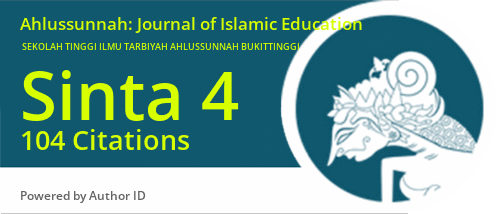Implementation of the Five Principles of Personality Through Programs and Activities of Students at Pondok Modern Darussalam Gontor
DOI:
https://doi.org/10.58485/jie.v1i2.113Keywords:
Five personality principles, daily program, student activitiesAbstract
Having a person with good morals and being able to respond to various kinds of moral decline that hinder educational development. So its implementation is very necessary as a first step in building the moral education system of the Indonesian nation. The formulation in this research contains an explanation of the concept of cultivating the five souls in the formation of santri morals at Pondok Modern Darussalam Gontor, the application of the five souls in forming santri morals at Pondok Modern Darussalam Gontor, the application of the five souls in forming santri morals at Pondok Modern Darussalam Gontor, as well as factors supporting and inhibiting the five souls in the formation of morals. This type of research is a type of qualitative descriptive research. This research is field research, the methods used are observation, interviews and documentation. The data source for this research is the Pondok Modern Darussalam Gontor 9 family. Data analysis used in this research uses a data reduction method which is then presented in descriptive form and verified by drawing conclusions. The results of the research show that the concept of five soul education at Pondok Modern Darussalam Gontor 9.
Downloads
References
Abu-Raiya, H. (2012). The psychology of Islam: Current empirically based knowledge, potential challenges, and directions for future research. APA Handbook of Psychology, Religion, and Spirituality (Vol 1): Context, Theory, and Research., 681–695. https://doi.org/10.1037/14045-038
Baumard, N., & Boyer, P. (2013). Explaining moral religions. Trends in Cognitive Sciences, 17(6), 272–280. https://doi.org/10.1016/j.tics.2013.04.003
Clipa, O., & Iorga, A. M. (2013). The Role of School-family Partnership on Moral Development. Procedia - Social and Behavioral Sciences, 76, 197–203. https://doi.org/10.1016/j.sbspro.2013.04.098
Das, S. W. H., Halik, A., & -, A. (2016). Paradigm of Islamic Education in the Future: The Integration of Islamic Boarding School and Favorite School. Information Management and Business Review, 8(4), 24–32. https://doi.org/10.22610/imbr.v8i4.1390
Garavan, T. N., & Dimitrov, D. (2012). Sources of meaningfulness in the workplace: A study in the US hospitality sector. European Journal of Training and Development, 36(2–3), 351–371. https://doi.org/10.1108/03090591211204788
Gribble, P. A., Hertel, J., & Plisky, P. (2012). Using the star excursion balance test to assess dynamic postural-control deficits and outcomes in lower extremity injury: A literature and systematic review. Journal of Athletic Training, 47(3), 339–357. https://doi.org/10.4085/1062-6050-47.3.08
Hasbiyallah, H., & Ihsan, M. N. (2021). Internalization of Education Character Based on the Five Souls of Modern Islamic Boarding School Al-Ihsan Baleendah. International Journal on Advanced Science, Education, and Religion, 4(2), 126–138. https://doi.org/10.33648/ijoaser.v4i2.151
Ismail, I. (2016). Character Education Based on Religious Values: an Islamic Perspective. Ta’dib: Jurnal Pendidikan Islam, 21(1), 41–58. https://doi.org/10.19109/td.v21i1.744
Kholily, A. M. (2017). Dilemma of Full Day School in Islamic Education in Indonesia. Didaktika Religia, 5(2), 345–360. https://doi.org/10.30762/didaktika.v5i2.865
Kulju, K., Stolt, M., Suhonen, R., & Leino-Kilpi, H. (2016). Ethical competence: A concept analysis. Nursing Ethics, 23(4), 401–412. https://doi.org/10.1177/0969733014567025
Lapsley, D., & Woodbury, R. (2016). Moral-Character Development for Teacher Education. Action in Teacher Education, 38(3), 194–206. https://doi.org/10.1080/01626620.2016.1194785
Lempert, M. (2013). No ordinary ethics. Anthropological Theory, 13(4), 370–393. https://doi.org/10.1177/1463499613505571
Muraca, B. (2012). Towards a fair degrowth-society: Justice and the right to a “good life” beyond growth. Futures, 44(6), 535–545. https://doi.org/10.1016/j.futures.2012.03.014
Murniyetti, M., Engkizar, E., & Anwar, F. (2016). Pola Pelaksanaan Pendidikan Karakter Terhadap Siswa Sekolah Dasar. Jurnal Pendidikan Karakter, 7(2). https://doi.org/10.21831/jpk.v6i2.12045
Nurhadi, N., & Harahap, M. I. (2021). Teacher’s Responsibility in Islamic Education (Relevance of Hamka and Hasan Langgulung Thought). Palapa, 9(1), 137–181. https://doi.org/10.36088/palapa.v9i1.1065
Rawal, L. B., Mahmud, K., Islam, S. M. S., Mahumud, R. A., Nuruzaman, M., & Ahmed, S. M. (2016). Training mid-level health cadres to improve health service delivery in rural Bangladesh. Primary Health Care Research and Development, 17(5), 503–513. https://doi.org/10.1017/S1463423616000104
Rohman Hakim, A. (2022). Islamic Religious Education Strategy in Instilling Character Moral Values in Adolescents. International Journal of Social Health, 1(2), 64–68. https://doi.org/10.58860/ijsh.v1i2.12
Sahin, A. (2018). Critical issues in islamic education studies: Rethinking islamic and western liberal secular values of education. Religions, 9(11). https://doi.org/10.3390/rel9110335
Sen, S., & Chakraborty, R. (2017). Revival, modernization and integration of Indian traditional herbal medicine in clinical practice: Importance, challenges and future. Journal of Traditional and Complementary Medicine, 7(2), 234–244. https://doi.org/10.1016/j.jtcme.2016.05.006
Sugarman, J. (2015). Neoliberalism and psychological ethics. Journal of Theoretical and Philosophical Psychology, 35(2), 103–116. https://doi.org/10.1037/a0038960
Suherman, S., Zafirah, A., Agusti, F. A., Sandra, R. P., Engkizar, & Efendi. (2021). Encouraging Students’ Active Learning Activities through the Implementation of MASTER Learning Model Based on Mind Mapping Techniques. Journal of Physics: Conference Series, 1940(1), 12094. https://doi.org/10.1088/1742-6596/1940/1/012094
Taufik, M. (2020). Strategic Role of Islamic Religious Education in Strengthening Character Education in the Era of Industrial Revolution 4.0. Jurnal Ilmiah Islam Futura, 20(1), 86–104. https://doi.org/10.22373/jiif.v20i1.5797
Tjitayi, K., & Osborne, S. (2014). At the heart of learning: (Series: Paper 3 of 4): Kurunta kanyintja: Holding knowledge in our spirit. AlterNative, 10(1), 23–32. https://doi.org/10.1177/117718011401000103
Vrazhnova, M. N., Anastasov, M. S., & Nikiporets-Takigawa, G. Y. (2021). Impact of professional self-improvement on the effectiveness of teachers in distance education. Revista Tempos e Espaços Em Educação, 14(33), e16159. https://doi.org/10.20952/revtee.v14i33.16159
Yilmaz, K. (2013). Comparison of quantitative and qualitative research traditions: Epistemological, theoretical, and methodological differences. European Journal of Education, 48(2), 311–325. https://doi.org/10.1111/ejed.12014
Downloads
Published
How to Cite
Issue
Section
License
Copyright (c) 2022 Achmad Rasyiddin, Arif Ridha, Fatimah Fatimah

This work is licensed under a Creative Commons Attribution-ShareAlike 4.0 International License.
Creative Commons Attribution 4.0 (CC BY)











